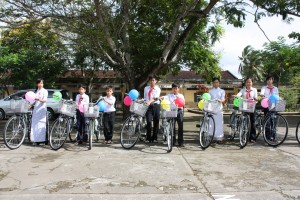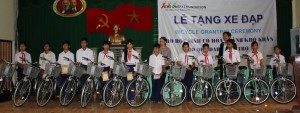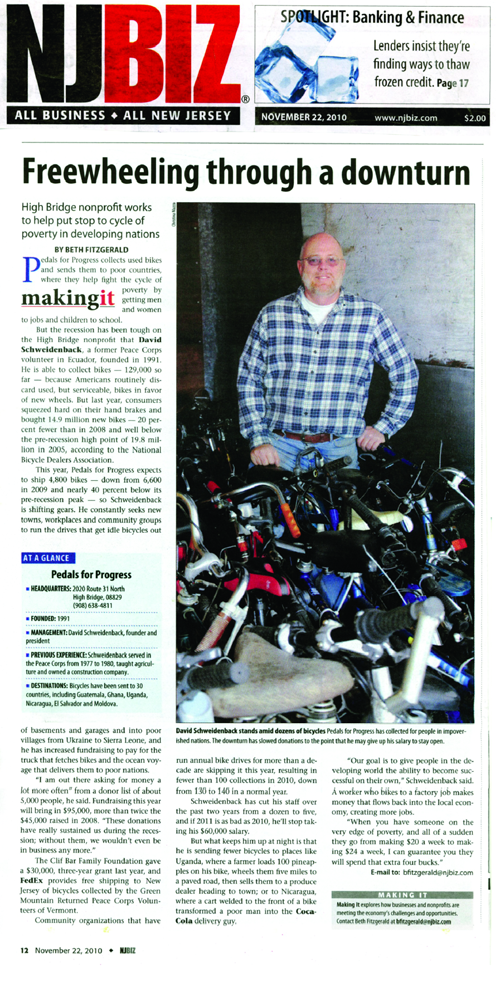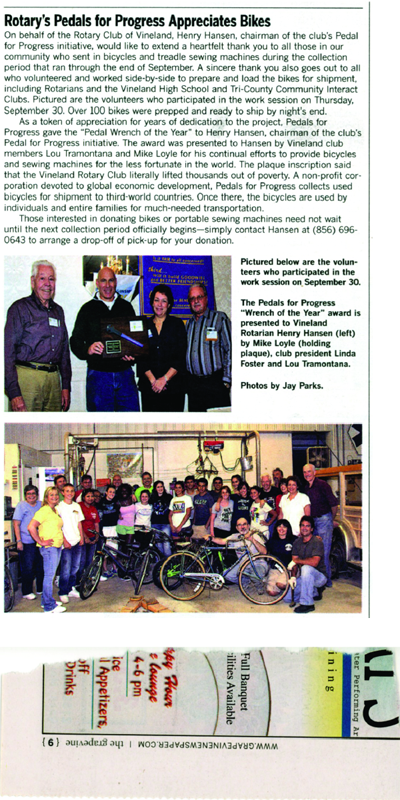By DEB DAWSON, Editor, Recorder Community Newspapers
Posted: Thursday, February 10, 2011
HIGH BRIDGE, New Jersey – David Schweidenback, 58, is a man who really loves his job. He doesn’t just love it — Pedals for Progress (P4P) is his 20-year-old baby. He nurtures it daily, and is proud of its accomplishments.
The nonprofit organization he launched in the Feb. 11, 1991, edition of the Hunterdon Review has come a long way since then.
To date, it has helped to bring 130,000 people out of poverty by providing them with the means to get to a job, or even create one, using bicycles.
“I had a really good idea one day, and I acted upon it. And, rather than control it, I distributed it. Gave everybody else my idea, so they could go out and do what needs to be done,” said Schweidenback.
So now, in addition to Pedals for Progress, there are 70 similar organizations in 15 countries that do what he does – collect bicycles, some in need of minor repairs, fix them, and ship them to developing countries to be sold to folks who really want to make a buck, but have no way to do it.
Those organizations account for another 130,000 bikes – 260,000 in all.
P4P is the brain child of this returned Peace Corps volunteer who saw for himself during his time serving in Ecuador just how much two wheels can mean.
Back in 1991, Schweidenback was focused on Sucua, Ecuador, his former Peace Corps service station.
“I was going to collect 12 bikes. I got 140. I was going to ship them all to Sucua, but the Ecuadorian government wouldn’t let me in.”
Why? “It’s good to be king,” he said. “The people on top were very happy with the way life was working. There are two types of countries: (1) The people on top are happy they’re on top. (2) The government wants to see some comprehensive change – see their people have a better life and move on and get better.
“At the end of the day, it’s their country. You can suggest, but you can’t mandate. I used to take it very hard. I used to want to say, ‘Can’t you see what happened in China?’” where bicycles once proliferated. Now Schweidenback says the Chinese want everyone to have a car.
“For several developing nations without much money, with a developing lower class, the elimination of poverty is always a decision. To get out of poverty, you have to get a job. There’s always work to be done.
“In these developing countries, most people are underemployed because of where they live relative to where work is available. If you make $2 a day, you’re not going to go out and take public transportation.”
He explained that in agrarian communities in third-world countries, the people have to get to the road from where they live – which is usually down a path maybe five miles away.
“They’re great farmers. They load a bike with produce and push it to the road where they can sell it. Without a bike, a lot of crops rot, because they can’t get it to the road.”
In Uganda, the average person lives four miles from safe, potable water. “People have 10-gallon jerry cans they fill with water and hang on either side of the back wheel, then put two cans on top. These guys go to the well and push water to customers for a living. They deliver water to people’s houses.”
P4P has shipped 19,000 bicycles to Rivas, Nicaragua, since 1992 and the city has created an infrastructure for the bicycles. The organization still sells about 200 bikes there annually.
In Rivas, Schweidenback said whole families commute on one bike. The father or mother may ride the children to school on the bicycle on the way to work, then pick them up on the way home. This has enabled the population to become more educated.
“By the time you’re 13 years old, you’re an adult with adult responsibilities. You’d go to school through the fourth or fifth grade and the necessities of life would come along,” said Schweidenback. Now students can ride instead of walk the five miles to and from school, which takes less time, and they can still do their chores when they get home.
But, Schweidenback does not believe the bikes should be given away. “People don’t take care of things they’re given. People take care of things they earn. If you give away, you create paternalism. We’re trying to create a more vibrant economic system where these people can help themselves. The average recipient has a 15 percent increase in income the first week they get a bike.”
Bikes are usually collected through drives given by church youth groups, rescue squads, fire companies and the like.
Every bicycle costs P4P about $35 from collection to delivery to the final owner. People who donate bikes also donate a minimum of $10 to P4P to help pay for repairs and shipping. P4P gets about $12 per bike from its overseas partners, who sell bikes for an average of $15.
“The last $13 I get from general begging and groveling,” he said. “We’re a charity. We exist by the giving of people who believe in our mission. There are about 5,000 on our mailing list. We go to them a couple of times a year. I’m a professional beggar.”
The partners who actually sell the bikes need to retain some of the money for a storefront, a warehouse with bars on the windows, a bike mechanic, salesperson, someone for accounting, electricity and water.
P4P has also branched out. In 1999 it began exporting used portable sewing machines to developing nations. “A sewing machine is employment for life,” Schweidenback said. “We’ve set up bunches of co-ops. We teach sewing.”
Schweidenback, who was a “2008 CNN Hero” and a “Rolex Award for Enterprise” winner, said his greatest accomplishment during these past 20 years is “survival. I’ve been through three recessions. We’re still steady, but it has never been easy.”
He thought a minute and added, “I have really had the opportunity to fulfill a dream I had to help people.”
To send a contribution, set up a bike drive, or for more information, call Schweidenback at (908) 638-8893, email dschweidenback@gmail.com, or visit the website at www.p4p.org.





